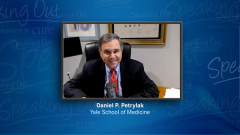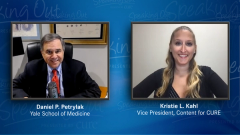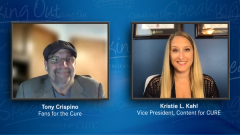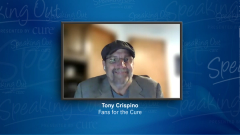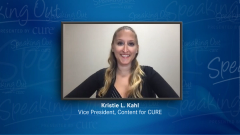
‘Planning Your Next Shot’ In the Prostate Cancer Continuum With Patient-Physician Communication
As part of its Speaking Out video series, on behalf of Fans for the Cure, CURE® spoke with Tony Crispino about the importance of patient-physician communication in prostate cancer.
Episodes in this series

Kristie L. Kahl: Can you speak to why it's important for patients to be their own best advocate, especially when it comes to their care?
Tony Crispino: It's always best to be your own advocate, in any form of care, but particularly in prostate cancer. Decisions that are going to be made can be left to the physician, not always the best decisions to be made for you. And the best way to make decisions is to educate yourself and to become knowledgeable about your own health. Most men don't do this prior to a diagnosis of prostate cancer. So when you go on into the physician's office, you're basically hearing what they're explaining to you, what they would do with prostate cancer, and they're not really listening to you and your understanding of prostate cancer. So part of the important part of the physician-patient relationship is going to be dependent on your ability to understand and your ability to know what your needs are. For a patient that doesn't need to be treated, they don't need to be hearing about its side effects of treatment, they need to be understanding about the psychosocial effects of not treating it. So it's important for all of these different aspects to come into your education, and know that your limitations are going to be your physician’s biggest limitations as well.
Kahl: How can patients effectively communicate with their physicians and make sure that your voice is heard too?
Crispino: Well, you know, in this day and age where we continue to see less and less of the physician, we live more of our life with our prostate cancer when our physician is not in the room. And it's important for you to note where you are with each of these individual steps because for some guys, (their response is) get (the cancer) out of me. I've heard guys who get prostate cancer, have urinary incontinence or lose their sex lives for the rest of their lives. This is the vast array of where you fit in your diagnosis of prostate cancer and where you understand prostate cancer because the first thing I know is that not all men who are treated with prostate cancer throw away their sex life and live with incontinence the rest of their lives. And conversely, not all men who are diagnosed with prostate cancer die of prostate cancer or need to treat it at all. And it's important for you to understand where you lie, where does the ball lie? And golf is where you play your next shot and pick your iron. Where do you lie in prostate cancer is where you should make your decisions from. And that happens with your knowledge and understanding and your communication with your physician.
Kahl: How does the caregiver or a patient's loved one also have a part in this communication and decision between treatments and having a voice?
Crispino: Probably one of the biggest mistakes a man can make, who's conscious of their situation, is that cancer is a diagnosis for the family. It's not just a diagnosis for you. There are psychosocial effects for your daughter, your son, your wife, your significant other, all of them are affected equally, in different ways. You think, “Well, I'm the one who's got the disease. What do you feel?” Well, you know, that's kind of a mixed bag of tricks, right? Because it's somebody who has been spending their entire life with somebody and they are facing (the diagnosis) or thought that they may be losing that person. The psychosocial effects for the caregiver can be equally as daunting as it is for the patient themselves. So it's very important that the caregiver also, in wanting to be strong for their significant other during their journey with prostate cancer, also looks at this as a learning opportunity and understanding opportunity for where they are. Because ultimately, when you finally get into the battle of prostate cancer, all of the challenges are shared. And it's very important for significant others to be educated as well to be able to deal with it.
Kahl: Looking back on your precancer self, what is one thing you now know about patient-physician communication that you wish you knew back then?
Crispino: I can almost laugh and say everything, because it really is. I mean, for me, it's a different story. I was 44 years old when I was diagnosed with prostate cancer, and it was the furthest thing from my mind, and no symptoms, and there was no reason to believe that I had a situation. But yeah, when it comes to dealing with the diagnosis of prostate cancer at the age of 44, or at the age of 88, obviously, there's a big difference. Most men at the age of 88 probably aren't going to be concerned as much about the long-term effects of living with prostate cancer. And a man at 44 might be concerned with having their lives cut short. And as you can see, looking at me now, that's not how it worked out, even though I had an advanced disease. So what were my feelings about understanding about prostate cancer when I walked in at the age of 44, versus what I know now, I think that it would have made a world of difference on how I dealt with prostate cancer. A lot of worry would have been set aside. Whereas maybe a lot of concern in areas that I should be paying attention to would have been better paid attention to. I think that it's very important for men to understand their health before they have to deal with it. What ways can you live longer also applies to your heart, applies to your weight, applies to your other general health. And all of these things can carry on over into your care for prostate cancer the same way. I didn't know about prostate cancer, but I wish I did.
Kahl: What would you say is your biggest piece of advice for a fellow patient who needs to find a more active voice in their treatment?
Crispino: Well, as I said in a prior conversation, education is the key. If a person that makes educated versus emotional decisions, they tend to be able to live with the decisions better, they tend to be able to handle the psychosocial effects of decision making better. It's really important for a patient to understand and not rush into therapy. But really if you have a need to rush into anything it's to rush into start talking to others to talk to others who have been down the road and are coming back from down that road and learn about their experiences because somebody is going to be just like you when they come back and you'd be a lot better off knowing that person than going it alone. So education is key.
Transcription edited for clarity and conciseness.

